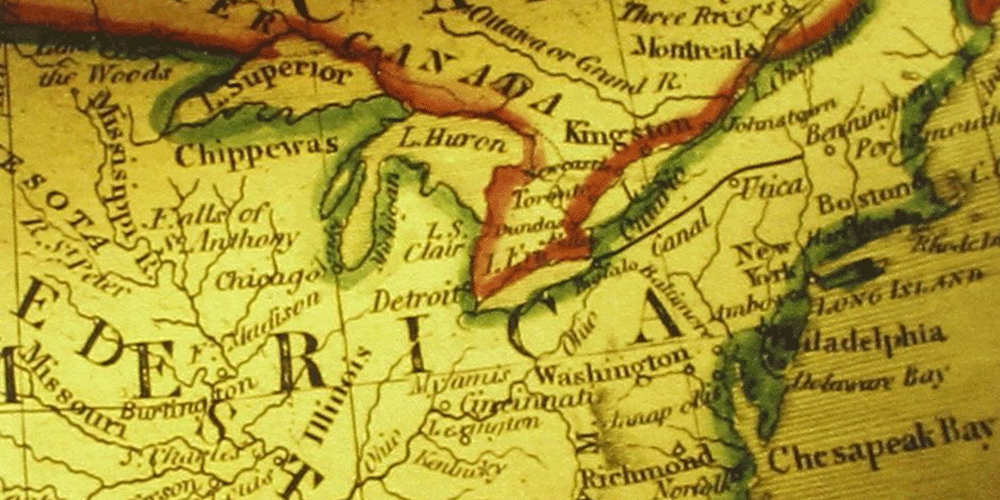This post may contain Amazon Affiliate links for which I may receive compensation.
I recently read a fascinating French book which I would recommend to anyone interested in the early colonial history of the US, or should I say “French America”. The author: Jean Raspail, a renowned French writer, journalist and also explorer. The French title: “En Canot Sur les Chemins D’Eau Du Roi: Une Aventure En Amérique (Le Livre de Poche) (French Edition)“.
The book is the story of an amazing adventure that Jean Raspail participated in with three friends in 1949 when he was only 23. From May 25 to December 10, 1949, for 200 days, these four young people canoed for 2,837 miles from Trois-Rivières in Quebec to New Orleans, through the Ottawa River and the Great Lakes… on the great King’s waterways!
In two canoes, Équipe Marquette (Team Marquette) – in remembrance of Father Marquette, the Jesuit missionary who discovered the Mississippi in 1763 – they travelled the land which once was called Nouvelle-France (New France), on the steps of the first French explorers in North-America (Champlain, Moyne d’Iberville, Father Marquette, Cavelier de la Salle, La Vérendrye, Frontenac and many more). This was a time in history when most of America was actually “French America”, a time period which seems as much forgotten today in America as it is in France.
This book is fascinating in many ways. The author constantly brings us from the present time of 1949, describing people and places – including the vast wilderness they traveled through – to the past, often recalling passages from the journals of these 17th-century French explorers. And with him, you truly feel the spirits of people who have come there before them, 200 years ago, as if no one has ever traveled on that path again since the 17th century.
Jean Raspail also makes you realize so vividly how tough and dangerous these expeditions were, simply by describing how they overcame the same physical obstacles themselves: rapids, portages, winds, and storms… not to forget black flies and mosquitoes.
Interestingly enough, Jean Raspail took 55 years to tell the story of this first expedition… Warning though: at times, the author is expressing strong anti-American pre-conceived opinions, never supported by facts, which simply need to be ignored to enjoy the rest of his book.
There are many passages of the book I would love to simply translate as they would take your imagination instantly to the past and the wilderness, or explain the present so well. One of them describes the origin of the little town of Portage, Missouri, an old portage of about one mile connecting the Saint-Laurent and Great Lakes to the vast Mississippi (through the Fox River and the Missouri River), and used by many French explorers of the time.
You will also learn that the shipwrecks of Cavelier de La Salle have been recently found and can be seen at Corpus Christi’s museum in Texas, or learn where the word Baton Rouge came from.
But I will simply translate this quote from the first few pages of the book: “Our world was the waterway. A deep silence was around us. Our canoes were traveling through a no man’s land of 200 years, the time which separates us from the explorers and pioneers of old French America.”
“They were called Voyageurs (travelers) or soldiers of the great portage. Explorers, missionaries, merchants, King’s officers, Compagnies franches de la Marine’s soldiers, with their grey tricorne hats, they conveyed furs, arms and tools, by rivers and lakes which formed the natural network of the North-American immensity in the 17th and 18th century. Day after day, they canoed – their hands tightly grasping their oar – and gave France an empire seven times its size, at the price of many exhausting achievements. With each of their trips, they pushed the frontiers farther, to the North-West, to the West and to the South. From Quebec city, to Trois-Rivières, Montreal (which was then called Ville-Marie), they embarked as soon as the ice melted in the spring, and were gone until the beginning of winter. Many never returned. When reaching the first rapids, Lachine’s rapids, on the Saint-Laurent just upstream from Montreal, at the end of Lake Saint-Louis, the crews were singing“…“they paddled fifteen hours a day, slept five hours, tortured by moskitoes and black flies, exposed to the attacks of Iroquois or Algonquians, portaged canoes and merchandises on their backs to pass by the rapids upstream, leaving out pieces of their skins, a myriad of people drowned, and crashed canoes on rocks, as they canoed downstream.”
The book is available in paperback: En Canot Sur les Chemins D’Eau Du Roi: Une Aventure En Amérique (Le Livre de Poche) (French Edition).
Further reading: Unfortunately, the author rarely provides references, but often refers to some explorers who wrote about their expeditions. From those mentions, here are some books which could be of interest:
- Les engagés du Grand Portage (French Edition)
- Voyages of Samuel de Champlain, 1604-1618: With a map and two plans
- Jean-Baptiste Perrault, marchand voyageur, parti de Montreal le 28e de mai 1783 (Collection Mekinac ; 3) (French Edition)
- Relations Des Jésuites: Contenant Ce Qui S’est Passé De Plus Remarquable Dans Les Missions Des Pères De La Compagnie De Jésus Dans La Nouvelle-france. … Du Gouvernement Canadien… (French Edition)
- The Jesuit relations and allied documents travels and explorations of the Jesuit missionaries in New France, 1610-1791 ; the original French, Latin, and Italian texts, with English translations and notes edited by Reuben Gold Thwaites. Cleveland.*REPRINT*
- Father Marquette’s Journal
- The French in the Heart of America (Classic Reprint)
- In Search of the Western Sea: Selected Journals of La Verendrye
- Journal de l’expédition du chevalier de Troyes à la baie d’Hudson en 1686 (French Edition)


